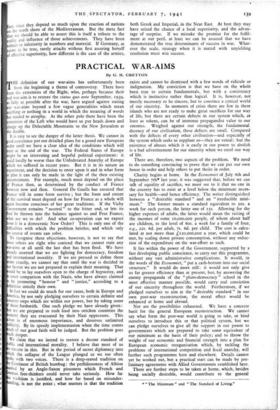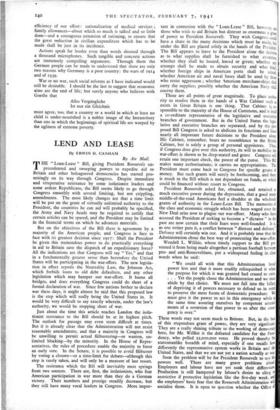PRACTICAL WAR-AIMS
By G. H. GRETTON
HE definition of our war-aims has unfortunately been from the beginning a theme of controversy. There have n the extremists of the Right, who, perhaps because their w•ar-aim is to restore the status quo ante September, 1939, s fully as possible after the war, have argued against stating y war-aims beyond a few vague generalities which mean nything or nothing in a world in which the meaning of words s tended to atrophy. At the other pole there have been the xtremists of the Left who would have us put heads down and rge up the Delectable Mountains to the New Jerusalem at e double.
It is easy to see the danger of the latter thesis. We cannot in ood conscience put out detailed plans for a grand new European der until we have a clear idea of the conditions which will list at the end of the war. The Federal States of Europe .ght be an interesting and hopeful political experiment: it ould hardly be worse than the Unfederated Anarchy of Europe hich we suffered in recent years. But it is in its nature an xperiment, and the decision to enter upon it and in what form plan it can only be made in the light of the then existing ircumstances. For example, much must depend on the place France then, as determined by the conduct of France een now and then. General De Gaulle has ensured that ranee will in some form survive ; but the form and extent f the survival must depend on how far France as a whole will gain become conscious of her great traditions. If the Vichy overnment remains " neutral " to the bitter end, or lets its eet be thrown into the balance against us and Free France, 'hat are we to do? And what co-operation can we expect om it in a democratic New Order? This is only one of the ifficulties with which the problem bristles, and which only e course of events can solve.
To recognise these objections, however, is not to say that ose others are right who contend that we cannot state any ar-aims at all until the last shot has been fired. We have ready asserted that we are fighting for democracy, freedom d international morality. If we are pressed to define those rms exactly, we cannot say that until the war is decided in ur favour we are not prepared to explain their meaning. That ould be to lay ourselves open to the charge of hypocrisy, and court comparison with the Nazis, who have always claimed be promoting " honour " and " justice," according to a finition strictly their own.
In fact we could do much for our cause, both in Europe and merica, by not only pledging ourselves to certain definite and crete steps which are within our power, but by taking some them forthwith. One such pledge we have already given: at we are prepared to rush food into stricken countries the oment they are evacuated by their Nazi oppressors. This tion is of enormous importance, and deserves unlimited blicity. By its speedy implementation when the time comes uch of our good faith will be judged. But the problem goes uch deeper.. We claim that we intend to restore a decent standard of blic and international morality. I believe that most of us e sincere in this. But in the period of secret diplomacy into hich the collapse of the League plunged us we too often ke with two voices. There is a deep-seated tradition on e Continent of British humbug: the perfidiousness of Albion ked by an Anglo-Saxon piousness which French and rman free-thinkers could never take seriously. How far tradition is justified, and how far based on misunder- ding, is not the point ; what matters is that the tradition exists and cannot be dismissed with a few words of ridicule or indignation. My conviction is that we have on the whole been true to certain fundamentals, but with a consistency which is instinctive rather than logical. It is, however, not merely necessary to be sincere, but to convince a cynical world of our sincerity. In moments of crisis there are few in these islands who are not ready to make great sacrifices for our way of life, but there are certain defects in our system which, at least as tokens, can be of immense propagandist value to our enemies. Weighed against our strength, the fundamental decency of our civilisation, these defects are small. Compared with the defects of every other civilisation—and especially of the system which seeks to supplant us—they are venial: but the existence of abuses which it is easily in our power to abolish is a bad advertisement for our sincerity when we extol our way of life.
There are, therefore, two aspects of the problem. We need to do something convincing to prove that we can put our own house in order and help others to put theirs in order.
Charity begins at home. In the Economist of July 6th and September 7th* last year, it was suggested that, before we can talk of equality of sacrifice, we must see to it that no one in the country has to exist at a level below the minimum neces- sary for health—and hence efficiency. The writer distinguished between a " desirable standard " and an " irreducible mini- mum." The former means a standard equivalent to zos. a week for each person, the latter one of 15s. Allowing for the higher expenses of adults, the latter would mean the raising of the incomes of some to,0oo,000 people, of whom about half are children, to the level of 6os. a week for a family of four, e.g., 22S. 6d. per adult, 7s. 6d. per child. The cost is calcu- lated at not more than £120,000,000 a year, which could be met, by scaling down private consumption, without any reduc- tion of the expenditure on the war-effort as such.
It lies within the power of the Government, supported by a fast developing public conscience, to carry out this programme, without any vast administrative complications. It would, in the words of the Economist," put a cash-bottom into our social structure." It would do more still: it would not only give us far greater efficiency than at present, but, by answering the enemy propaganda of the " pluto-democracy " school in the most effective manner possible, would carry real conviction of our sincerity throughout the world. Furthermore, if we pledged ourselves to aim at the " desirable standard " in our own post-war reconstruction, the moral effect would be enhanced at home and abroad.
Nor are the possibilities exhausted. We have a concrete basil for the general European reconstruction. We cannot say what form the post-war world is going to take, or bind ourselves to introduce this or that political sytsem, but we can pledge ourselves to give all the support in our power to governments which are prepared to take some equivalent of our minimum as the basis of their policy; and to throw the weight of our economic and financial strength into a plan for European economic reorganisation which, by tackling the problems of international competition and fiscal anarchy, will further such programmes here and elsewhere. Details cannot yet be worked out, but a practical start can be made by pre- liminary agreements with Allied Governments established here.
There are further steps to be taken at home, which, besides being socially desirable, would contribute to the general *"The Minimum" and "The Standard of Living." efficiency of our effort: rationalisation of medical services ; family allowances—about which so much is talked and so little done—and a courageous extension of rationing, to ensure that the great reduction in civilian expenditure which has to be made shall be just in its incidence.
Actions speak far louder even than words shouted through a thousand microphones. Such tangible and concrete actions are immensely compelling arguments. Through them the German people can be made to understand that there are only two reasons why Germany is a poor country: the wars of 1914 and of 1939.
War or no war, such social reforms as I have indicated would still be desirable. I should be the last to suggest that economic aims are the end of life; but surely anyone who believes with Goethe that Alles Vergangliche 1st nur ein Gleichnis must agree, too, that a country or a world in which at least no child is under-nourished is a nobler image of the Intransitory than one in which the beginnings of spiritual life are warped by the ugliness of extreme poverty.































 Previous page
Previous page